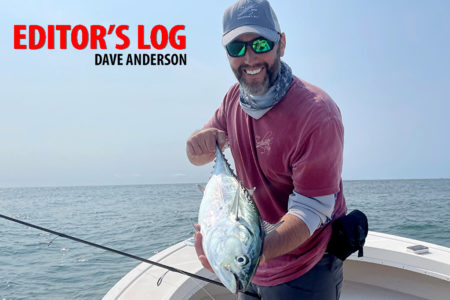The official announcement of seasonal regulations seems to come later and later each year. Due in part to the complexities of managing uber-restrictive policies in the last reauthorization of the Magnuson Stevens Act in 2006, the national debate over regional fisheries has grown intensely political since our federal fisheries law was disassembled and reengineered with rigid annual catch limit or “ACL” requirements. Throw in a government shutdown and voila, a carnival becomes a full-blown circus.
Earlier this year, the deliberative bodies that manage our fisheries voted to keep last year’s fluke and sea bass regulations in place for 2019. At the March 7 meeting of the New Jersey Marine Fisheries Council (Council), it was agreed that black sea bass would remain the same with a 12-1/2-inch minimum and 10 fish bag limit to start the season on May 15.
On the fluke front, state officials were looking to finagle a few extra days of season out of those same “deliberative bodies” with hopes of having better news when the Council convened again on April 16. Perhaps the current administration in Trenton chose not to push back against federal regulation as hard as the last administration; suffice to say nothing much was finagled. By a 7-1 vote, Council approved a May 24-September 21 season with a three fish bag and 18-inch size limit along the coast, a 17-inch minimum size and three fish bag west of COLREGS on Delaware Bay, and a 16-inch minimum size and two fish bag for surfcasters at Island Beach State Park. It still needs rubber-stamp approval from the “deliberative bodies” but expect to begin bucktailing again the Friday before Memorial Day in New Jersey.
The recreational fishing community could certainly use a little more stability and response from the bureaucracy; it’s hard to blame our state regulators when regulations have been compounded by legislative mumbo jumbo at the federal level. Except for a few elite types who look down their collective noses at fluke, sea bass and porgy fishermen – along with their friends in the high-finance environmental business world advocating for even stricter regulations – most fishermen (and state officials) would freely admit that the way fluke and sea bass are managed is in dire need of change.
Look at NOAA Fisheries’ new recreational data collection, the Marine Recreational Information Program, or MRIP. Taking old survey data and “recalibrating” based on new methodologies (basically, they’re now mailing postcards to random addresses instead of cold-calling), NOAA Fisheries has magically increased recreational effort and harvest by three-fold. Statistically speaking, this also showed the fluke biomass to be three-times more robust than originally believed.
This good news led to a 40% increase in fluke harvest in 2019; the bad news is that the commercial sector got a real poundage increase while the rigid ACL requirements in Magnuson Stevens resulted in our increase coming in the form of last year’s regulations. ACLs are about managing by pounds, and so long as recreational harvest poundage is tabulated by a postcard from NOAA, expect more of the same in years to come.
“We didn’t even challenge the MRIP data,” Capt. Bob Rush told me later after the April 16 meeting, obviously frustrated by the process as a council member. “We get more quota but we get spanked because of MRIP. We can’t liberalize anything, even with more quota!”
It was Capt. Rush’s single opposing vote at yet another sparsely-attended meeting of Council that stood out; three members of the public, two charter boat captains, one tackle shop owner, a pair of reporters and roughly nine state workers sitting and watching a mostly symbolic gesture by way of a single, solitary hand raised in opposition to status quo.
And why not; isn’t “status quo” really just another “symbolic gesture” by the deliberative bodies and elite types towards New Jersey’s fluke and sea bass anglers?




